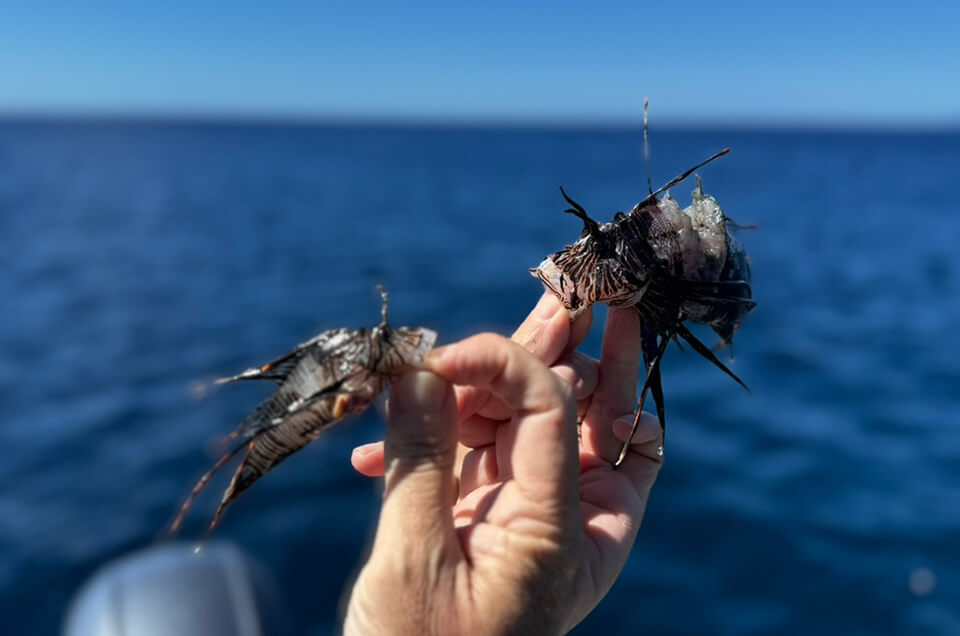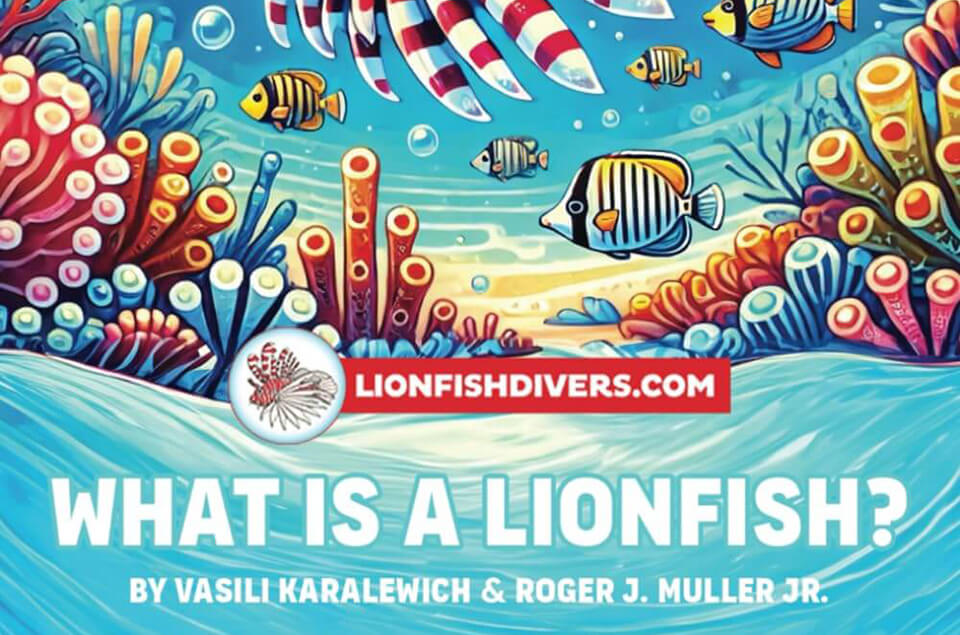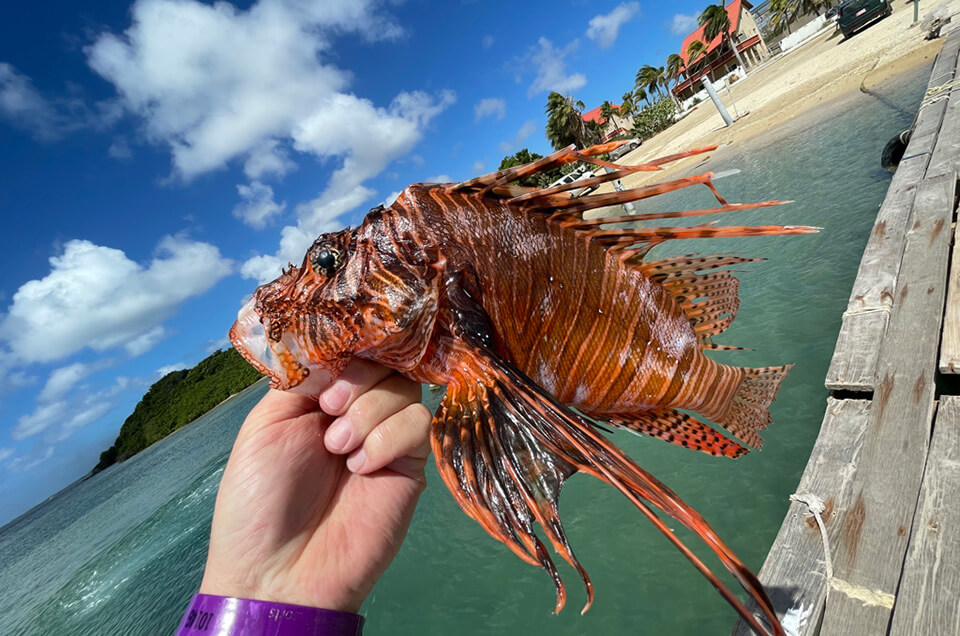Why Are Lionfish Invasive?

The lionfish is a carnivorous, venomous, and invasive fish species that originated in the South Pacific and Indian Oceans. Over time, lionfish have spread and invaded the Atlantic Ocean, greatly affecting the ecosystems. Lionfish have many different subtypes, including the red lionfish (Pterois volitans) and common lionfish (Pterois miles).
Lionfish are distinguishable by their reddish, brown, or white stripes on their bodies, fan-like fins, and several venomous spines. They use these stinging venomous spines as a defensive mechanism against humans and other species. Lionfish prefer warm, tropical waters with reefs, rocky crevices, mangroves, and seagrass to hide in when they ambush their prey.
Lionfishdivers.com, founded by International Lionfish Hunter and Professional Scuba Instructor Roger J. Muller, Jr., is committed to raising awareness of the lionfish invasion, as well as providing information on lionfish hunting, safety, and other lionfish organizations. Learn more about lionfish, invasive predators, and why they’re a problem everyone should be concerned about.
What Is an Invasive Species?
An invasive species is any type of organism that spreads outside of its native habitat to a new area. These organisms must meet a few factors to be considered invasive. The species must:
- Be able to adapt to the new area easily.
- Reproduce quickly.
- Cause economic or environmental harm to the new region.
Invasive species are one of the leading threats to native wildlife and ecosystems, causing harm to the environment, ecosystems, and even the property and health of humans.
Why Are Lionfish Considered Invasive?
As mentioned above, the natural habitat of lionfish is in the Indo-Pacific region, which consists of many different areas. Lionfish have traditionally lived in the waters of Japan, Indonesia, and South Korea to the coasts of Western Australia. Over time, the lionfish population has rapidly grown in the Atlantic Ocean, being found along the Eastern Seaboard and into the Gulf of Mexico and the Caribbean Sea. They are now considered invasive there for a few reasons, such as:
No Known Predators
In a lionfish’s native habitat, they typically feed on crabs, shrimp, and other small fish. Lionfish don’t have many predators – but in their native habitats, some can include eels, scorpion fish, and frogfish. However, in the Atlantic Ocean, their known predators are not there. This allows them to reproduce without being preyed upon, stay at the top of the food chain, and thrive in their non-native environment.
Rapid Reproduction Rates
Lionfish are quick reproducers, with a mature lionfish reproducing every three to four days and releasing between 15,000 and 30,000 fertilized eggs at one time. This means that a single lionfish can release as many as 2,000,000 eggs per year. These eggs can also not be eaten by other species because they contain a toxic coating. These factors allow the lionfish population to multiply quickly, which further enhances the inequality and competition that they create in the Atlantic ecosystems.
Voracious Appetites
Lionfish have very strong appetites. They are also non-selective feeders, meaning they will eat mostly any kind of fish they come across. By the time a lionfish turns two, it can eat up to 60,000 other reef fish. In the Atlantic Ocean, lionfish eat more than 50 species of fish and crustaceans, with many of them being crucial to the underwater environment. The lionfish out-competes with the other species for food and impacts the food chain and ecosystem as a whole.
These are the main reasons why lionfish are considered an invasive species. If you’re interested in learning more about lionfish and how they affect non-native ecosystems, you can read the Lionfish Educational Flip Books Vol. 1 and Vol. 2, or check out this YouTube video from Lionfishdivers.com.
What Problems Do Lionfish Cause?
More and more people are becoming aware of the threat of the invasive lionfish – but not everyone is aware of the extent of the problems they can cause. The lionfish invasion of the Atlantic and Caribbean Oceans causes many problems, mainly economic and environmental ones, including:
Environmental Problems
Lionfish result in environmental problems by disrupting the non-native ecosystems of the Atlantic Ocean and causing damage to the underwater environment. They do this by eating large numbers of fish, leaving little food for important native species like grouper and snapper. This affects both the populations of the fish being eaten and the fish being starved.
As their populations grow, lionfish also negatively impact coral reefs by eating the fish that consume algae to help keep the reefs healthy. This leads to disruptions of the ecosystems in the coral reefs, with studies showing that just one lionfish living on a coral reef can reduce the presence of native reef fish by nearly 80 percent.
Economic Problems
Lionfish are causing a decline in other types of fish that many societies use as food sources, impacting commercial fishing and the food chain. They can also negatively impact tourism in a few ways. People in the Caribbean and Western Atlantic Basin area depend on the coral reefs for tourism. If they get irreparably damaged, these residents will experience decreasing tourism rates.
Another way lionfish can impact tourism is because of the fact they can sting humans. When the lionfish population keeps increasing rapidly, they can start spreading into tourist areas and lead to accidental stings. In turn, this can cause further problems with people wanting to visit.
Once an invasive species like the lionfish has infiltrated an area and established a thriving population, they become nearly impossible to eliminate using traditional methods. Humans have begun to counteract lionfish by making a sport out of killing them with lionfish hunting. Lionfish hunters travel around the southern United States and the Caribbean to spear, capture, and remove lionfish from their non-native waters.
How Did Lionfish Become a Problem in the Atlantic and Caribbean Oceans?
Although lionfish are native to the Indian and South Pacific Oceans, they are also a popular choice in home and public aquariums around the world, especially in the United States. However, they grow to be as long as 15 inches and can live 10 to 20 years, which has resulted in owners releasing them into the ocean.
This is what is believed to have led to lionfish invasion into the Atlantic Ocean, at least in part: people releasing their unwanted lionfish into the ocean, not knowing the negative impacts it could have on the environment. Since lionfish don’t have known predators in the Atlantic waters and reproduce extremely quickly, their population has grown uncontrollably and is now considered an invasive problem.
More Frequently Asked Questions about Lionfish
Do lionfish eat coral reefs?
Lionfish do not eat coral reefs. Rather, they eat the fish that help the coral reefs thrive, like the species that eat harmful algae. As the reef fish population decreases from the lionfish eating them, the ecosystem in the reefs is negatively affected.
Are lionfish still a problem?
Yes, lionfish are still a problem because they resist conventional methods typically used to control invasive species. One of these methods is training other types of fish to eat the invasive species, but this has been tried and doesn’t work with lionfish. Another method is trapping the invasive species. However, lionfish can move freely in and out of traps. So this doesn’t work either.
How can you help fight the lionfish problem?
Humans are essential in helping to control the lionfish problem. This is because the best way to control them is by removing them, which humans are capable of. One of the best ways to do this is with lionfish hunting, using a special spear and other proper hunting equipment.
If hunting isn’t your style, you can also help by raising awareness of the invasive species, reporting sightings to local environmental authorities, donating to lionfish containment organizations, or even eating and learning how to cook lionfish.
Can the lionfish problem ever be stopped?
Unfortunately, most scientists believe it is unlikely to reverse the lionfish invasion of Atlantic waters. This is because it would be very costly, difficult to achieve, and even impractical. However, researchers think it’s possible to control the spread of lionfish in certain areas, mainly by hunting them. This is why every human needs to do their part to help reverse the problem as much as possible.
Learn More about Lionfish Today
Now that you’re familiar with why the invasive lionfish pose a problem, you can get involved to help fight them. Lionfishdivers.com was founded by Roger J. Muller, Jr., an International Lionfish Hunter and Professional Scuba Instructor with the mission of raising awareness of the lionfish invasion. To learn more about lionfish, hunting for them, or how you can get involved, contact Roger J. Muller, Jr. at Lionfishdivers.com today and help prevent the lionfish problem from worsening.





